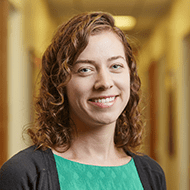ASHG trainee newsletter writer Irene Park interviewed Christa Wagner, PhD, who is the 2016-2017 ASHG-NHGRI Genetics and Public Policy fellow. Dr. Wagner recently completed her PhD at Johns Hopkins University School of Medicine, where she studied genetics and immunology.
May 2017

(Courtesy Dr. Wagner)
Public policy and science have a large intersection, especially in the field of genetics. For example, increasing usage of DNA sequencing is raising numerous questions about how to handle genetic information in healthcare and research settings.
The American Society of Human Genetics and the National Human Genome Research Institute co-sponsor the Genetics and Public Policy Fellowship to help an early-career genetics specialist transition into a policy career, providing the fellow with experiences at three places: the National Institutes of Health, Capitol Hill, and the non-profit science advocacy sector at ASHG. The 16-month fellowship provides an opportunity for the fellow to work at Congress.
ASHG: What motivated you to apply for the genetics and policy fellowship?
Dr. Wagner: In graduate school, I studied a rare inherited premature aging disorder that in some cases leads to severe immune deficiency. By meeting patients and their families, I became interested in understanding how legislation is made, especially with regards to human subjects research and public health programs like newborn screening. I was curious to know who informs legislators about research and patient perspectives, and thought that I would enjoy being that bridge from patients and researchers to policymakers. I thought that the ASHG Genetics and Public Policy Fellowship would provide me with the perfect exposure to the policy world from different settings at the NIH, Congress, and ASHG.
ASHG: What aspects of your PhD training have prepared you for working with policymakers? Were there any outside experiences that also prepared you?
Dr. Wagner: Some of the best preparation I had came through opportunities to communicate with diverse audiences. An important part of working with policymakers is being able to translate your issue to non-scientists. When I was a student, I had the opportunity to speak with patients and philanthropists about the importance of my research and how they could contribute to our understanding of aging to improve patient care.
Another outside experience I had was a short fellowship at a patient advocacy non-profit in Washington, D.C., which allowed me to get a taste of what it’s like to interact with Capitol Hill. I went to graduate school at Johns Hopkins, which recently launched a wonderful career preparation program called the Biomedical Careers Initiative. This program allows PhD students to take a short leave of absence to participate in one of a variety of non-academic experiences, introducing the student to the many opportunities available to scientists while getting in some important networking.
ASHG: What is the most exciting aspect of your fellowship? What’s the most difficult?
Dr. Wagner: I am actually really enjoying working on Capitol Hill. Even though working for a Democrat (Senator Sherrod Brown of Ohio) this year does not allow us to push a lot of issues in a Republican majority, there is still a lot going on, and it’s exciting to see how different pieces fit together to drive a policy or legislation forward. Coming from the lab where there is a bit more room for independence in day-to-day activities, it has been difficult learning to work under the hierarchical system in the government. Both at NIH and on the Hill, any creative ideas or even wording for public documents have to be pre-vetted by a handful of people before you can take action.
ASHG: How would you describe your typical day?
Dr. Wagner: I would say there hasn’t been a real typical day in the 115th Congress! But currently, I am involved in a variety of things, including meetings; research and outreach about pending legislation; briefings about hot topic policy issues; and preparation of briefing materials for other staff members or for the Senator. I also spend a lot of time with constituents. A large chunk of my day is devoted to meeting with Ohioans who come to Washington to share their stories and concerns with their representatives. I have really enjoyed these opportunities to learn more about Ohio and the variety of healthcare and research issues that real people face on a day-to-day basis.
ASHG: Do you have any advice for current ASHG trainees who might want to pursue a career in public policy?
Dr. Wagner: Get involved! Check out the Policy & Advocacy page on the ASHG website. You can read the Society’s statements regarding topics like research funding and genetic protections for patients and research participants, and can also learn about how you can communicate ASHG’s concerns to your representatives. Locally, you can start a policy club or ask about volunteering in the government relations office at your school. You can also start a science café, where you can meet with folks from the community to talk about your research and hear feedback from your non-scientist neighbors.
